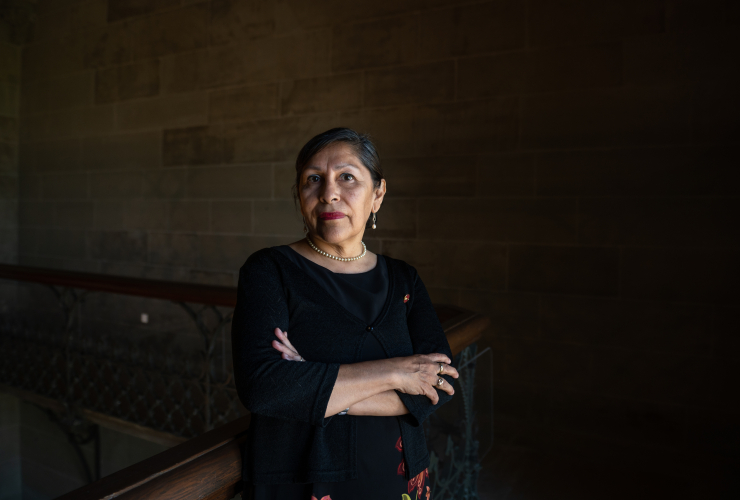The news these days is replete with messages that Canada requires more than $100 billion investment annually to successfully transition our economy to achieve net-zero greenhouse gas (GHG) emissions.
The numbers seem daunting but are not really when one thinks of the balance sheets of Canada's largest financial institutions. What is at stake in deploying this capital is fundamental ─ our very existence.
We know from recent experiences of wildfires, flooding and storms that climate-related acute events are increasing in frequency and severity, and we need to act urgently to protect humanity and other species.
Government intervention is required to press businesses and investors to take their fair share of responsibility in financing the transition. Enter the Taxonomy Roadmap Report, proposed by the Sustainable Finance Action Council (SFAC), an advisory group of financial institutions created by the federal government.
SFAC advocates a system (“taxonomy”) of classifying financial services and products as “green” or “transition” finance so that financial institutions in their lending and investment activities, companies in their business planning, and consumers in their purchase of products know exactly how their money is (or is not) supporting the transition.
Definitions must be clear, transparent and have integrity if we are to accelerate capital investment into sustainable assets and projects. It is essential that the taxonomy be science-based and developed with input from the financial sector, civil society organizations, and all levels of government.
The Taxonomy Roadmap was finalized in September 2022, but not released to the public until March 2023. It calls for a taxonomy council comprised of representatives from the Bank of Canada and prudential supervisors; and importantly, the proposed council now adds voting representation from civil society organizations, Indigenous communities and governments, and provincial and territorial governments in addition to the financial sector, which means a broader set of perspectives to develop credible, science-based definitions that can be used across the entire economy.
A community stakeholder advisory group will be composed of non-governmental organizations, youth climate groups and other research and community organizations, recognizing the intergenerational importance of a credible taxonomy.
The roadmap states that to be eligible to be designated as green or transition finance, three key requirements must be met.
Companies must undertake company-level net-zero target setting, transition planning, and effective climate disclosure for their own operations and those they intend to finance; the projects or services must be evaluated against framework criteria to determine whether they are green or transition; and the company issuing the products or services must assess the project against “do no significant harm” (DNSH) criteria to ensure the project is not detrimental to other environmental, social and governance (ESG) objectives.
If a project violates the DNSH criteria, it can’t be deemed as green or transition finance. All projects related to solid fossil fuels are ineligible, as are any projects that create carbon lock-in and path dependency, are at a high risk of becoming stranded in net-zero pathways due to high Scope 3 carbon emissions, and/or have Scope 1 and Scope 2 carbon emissions that are inconsistent with net-zero pathways.
Getting the taxonomy in place would help reduce “greenwashing” in the business and financial sector, where claims are being made that products and services mitigate climate-change impacts when they do not. An effective taxonomy, if science-based and backstopped by strong enforcement measures, could stem the amount of greenwashing and actually put Canada on a path to net zero.
Yet, the setting up of the council and its safeguards appears stalled, even though 27 of Canada’s largest financial institutions, including banks, insurance companies, and pension funds, have unanimously supported its creation.
Kathy Bardswick, chair of SFAC, has said the government has given her no indication of a timeline to formalize the taxonomy.
More than 30 different countries and regions have finalized or are developing a taxonomy, and Canada is seriously lagging, which harms our ability to attract and retain capital. Once Canada has its taxonomy, it has the potential for broad use, including by prudential regulators to ensure the safety and soundness of Canada’s financial system.
It will support innovative businesses that are trying to offer products and services that align with a circular economy and offer a just transition to net-zero emissions.
Activities that meet the criteria for transition are supposed to facilitate transformational emissions reductions while reducing the risk of carbon lock-in and stranded assets.
What constitutes transition financing will no doubt be subject to rigorous debate once the council is created, for example in the energy sector. However, a “taxonomy custodian” will be tasked with protecting the scientific integrity of the definitions, following global best scientific evidence.
Under the current proposed structure, Indigenous, civil society and pension fund representation on the council will help ensure the accountability and integrity of the taxonomy as it moves to the next steps of deciding what should be eligible. It is critical that the taxonomy proceeds as quickly as possible as Canada makes the shift toward net-zero emissions.
Dr. Janis Sarra served as UBC Presidential Distinguished Professor from 2014 to 2019, an appointment by the president to recognize a faculty member who has made outstanding contributions as a scholar and academic leader. Prior to this appointment, Dr. Sarra served as director of the Wall Institute for Advanced Studies at UBC. Dr. Sarra is professor of law at the Peter A. Allard School of Law and founding director of the National Centre for Business Law. She served as associate dean of the Allard School of Law until 2007, with oversight of development, strategic planning, alumni relations and communications. Dr. Sarra is the principal co-investigator of the Canada Climate Law Initiative, a research collaboration between UBC and York University, and is Canadian investigator with the Commonwealth Climate and Law Initiative at Oxford University.
Read the Report! You could
Read the Report! You could drive a tar sands dump truck through this loophole:
Eligible projects: "These include projects that sell products that, due to high scope 3 emissions and the availability of viable alternatives, are expected to face decreasing global demand in transition. To remain transition-eligible, these projects must have well-defined lifespans that are approximately proportionate to the expected decline in global demand in representative 1.5 °C pathways. "
In other words, keep investing in oil production; justified by the argument that "we still need it for the foreseeable future"; as judged by oil companies. This is greenwashing at its finest!
Not impressed either with how long it took to write and release this short sighted, misleading document - 2030 is not so far away.
The two terms that make me
The two terms that make me angry are Carbon Neutral and Carbon Offsets, both of these terms are like Superman and Batman, in that they are both fictional.






Comments